2014春新人教版Unit 9Have you ever been to a museum 短语及重点句总结
人教版八年级英语下册《Unit 9 Have you ever been to an amusement park.(通用)》教案_1
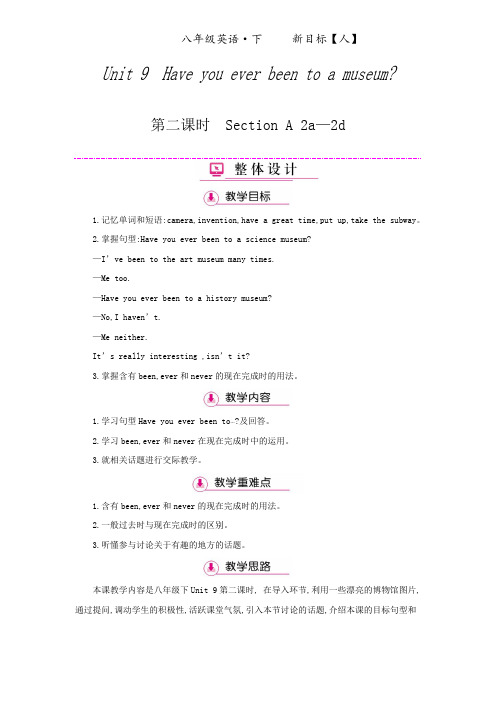
八年级英语·下新目标【人】Unit 9 Have you ever been to a museum?第二课时Section A 2a—2d1.记忆单词和短语:camera,invention,have a great time,put up,take the subway。
2.掌握句型:Have you ever been to a science museum?—I’ve been to the art museum many times.—Me too.—Have you ever been to a history museum?—No,I haven’t.—Me neither.It’s really interesting ,isn’t it?3.掌握含有been,ever和never的现在完成时的用法。
1.学习句型Have you ever been to…?及回答。
2.学习been,ever和never在现在完成时中的运用。
3.就相关话题进行交际教学。
1.含有been,ever和never的现在完成时的用法。
2.一般过去时与现在完成时的区别。
3.听懂参与讨论关于有趣的地方的话题。
本课教学内容是八年级下Unit 9第二课时, 在导入环节,利用一些漂亮的博物馆图片,通过提问,调动学生的积极性,活跃课堂气氛,引入本节讨论的话题,介绍本课的目标句型和单词,在听力环节,注重对学生听力策略的指导,消除学生对听力的“恐惧”心理,让学生能够高效做题。
2d教学是本课综合运用的体现。
通过学习词组、重点句到对话的填空让学生的学习有渐进的过程;抽取学生进行角色扮演,对学生是知识升华的过程。
设计教学PPT,录音机,图片,多媒体。
StepⅠ.Lead in[设计意图]调动学生情感,激活他们头脑中关于过去去过的地方的情感,导入新授。
Leading inT:Boys and girls,do you like traveling?S:Yes.T:Great! Most of you like traveling very much.Me too.Look at the pictures.I went to a lot of places last year.Guess where I went? Use “have/has been to”.S1:You have been to Shanghai.S2:I know you have been to the space museum.S3:You have been to the amusement park.S4:You have been to the zoo.S5:…T:Great! All of you did well.I have been to so many interesting places.Which of these places would you like to visit? Please rank them 1 to 6.space museumhistory museumart museumwater parkzooamusement parkS:…[设计意图]通过情境引入,激发学生情感,便于导入新授内容。
新课标人教版八年级英语下册Unit 9 Have you ever been to an amuse

—So did Tina.
中国地图
蒂娜也去了。
—He has been a soldier for two years.
要点点拨
他已经当了两年兵了。
go inline skating 滑旱冰
—So have I.
我也是。
全析提示
3.Look at the map of the town.Listen and circle the places 助动词 have 和 has 可以与前面的
you hear.
主语缩略’ve 和’s。
看城镇的地图。听录音并圈出你听到的地方。
如:we’ve,they’ve,he’s,
water world 水上世界
it’s 等。
city library 城市图书馆
have not 常缩略为 haven’t,has
fun times amusement park
如果说“欢迎回家”该怎么说呢?
把 1a 中你的回答和你搭档的回答对照一下。
Wele back home!
4.For me,“I have to!” is number two.
对我来说“I have to!”是第二位的。
要点点拨
5.Listen to a teacher interview a student.Circle the newsletter 业务通讯;新闻信札
route“路线、小路、小巷”,使
The main attraction was a Charlie Chaplin film.
用 X 围也较小。course 表示船的
吸引人的主要是查理·卓别林的电影。
“航道”或飞机的“航线”。
The idea of being a teacher has little attraction to young
初中英语人教版八年级下册《Unit 9 Have you ever been to a museum
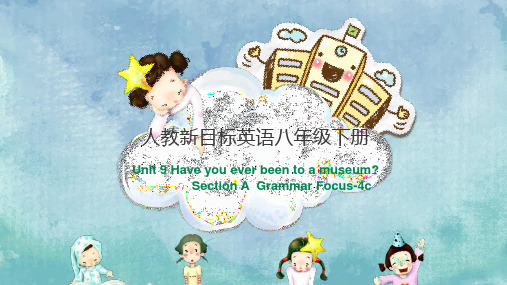
have gone 第一人称 to
She’s not here. She has gone to Qingdao.她不在这里,她去了青岛。
have been 在某地呆了多长时间,常接时间 He has been in London for half a
in/at
段
year.他在伦敦呆了半年。
presentation Grammar
5. A: Have you ever ___v_is_i_te_d__
(visit) the history museum?
B: No, I’ve never___b_e_en___ (be) there.
presentation
4b.Fill in the blanks with the correct forms of the verbs in brackets.
new words learn new words
3.theme/θiːm/ n. 主题 Then we have their new theme. 然后我们还有了新主题
4.ride /raɪd/ n. 供乘骑的游乐设施;短途旅程 What do you ride to go? 你乘坐什么去的?
5.province /'prɒvɪns/ n. 省份 which province are you from? 你来自哪个省?
presentation Grammar
2.have/has been to,have/has gone to与have/has been in的区分
have been 曾经去过,现已回来,可接次数 to
He has been to Beijing 3 times.他 去过北京三次。
2014春人教新目标八下unit9_have_you_ever_been_to_a_museum__Section_A_3

你曾经去过科学博物馆吗?
Have you ever been to a science museum?
是的,我去过科学博物馆。/不,我从未去过科学 博物馆。
Yes, I’ve been to a science museum./ No, I’ve never been to a science museum.
构成:have(助动词) + p.p has(第三人称单数助动词) + p.p
疑问式
回答
Have I/you finished the work? Has he/she finished the work?
Yes, you/I have. No, you/I haven’t. Yes, he/she has. No, he/she பைடு நூலகம்asn’t.
have not 常缩略为 haven’t。 has not 常缩略为 hasn’t。
Have you had your 表示过去发生或已 lunch yet? 经完成的动作对现
Yes, I have. I have 不饿了)
在造成的影响或结
just had it. (现在我 果。
I have already taught him some English. John has never been to the space museum. My boy has just started junior high school.
I. 根据括号内的要求完成下列各句,每 空一词(含缩写)。 1. My parents have come back already. (改为否定句) My parents _______ haven’t ______ come back ____. yet 2. The boys have been to Japan lots of times. (改为一般疑问句) _______ Have the boys _______ been to Japan lots of times?
2014春人教版八下unit9 Have you ever been to a museum
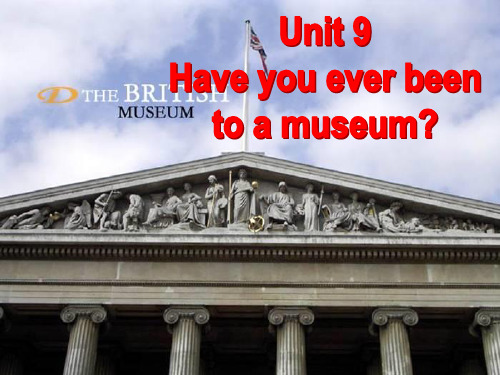
Conversation 2
1. Linda has been to the amusement park.
T/F
2. Linda went to the amusement park
yesterday. T/F
3. Linda is going to the amusement park
again by bike. T/F
2d Role-play the conversation.
Yes, I have. I went there back in April. … I went to the film museum last weekend. Have you ever been there? …
1. I learned about the inventions that led to color movies, too. 我还了解了一 些发明,它们成就了彩色电影。 此处learn是“了解;获知;得知”的
1. Which three museums do the students talk about?
The American Computer Museum, the
space museum____ history museum____ art museum ____ zoo ____ water park ____ amusement park ____
Talk something about the picture.
Sarah
Claudia
Listening 1 Choose the best answer.
( T ) 3. International Museum of Toilets is a very unusual museum. ( F ) 4. India has the most advanced toilet. ( F ) 5. Linlin didn‟t know why her grandpa loved drinking and collecting tea set.
2014人教八年级下英语Unit 9 Have you ever been to a museum Section B 1
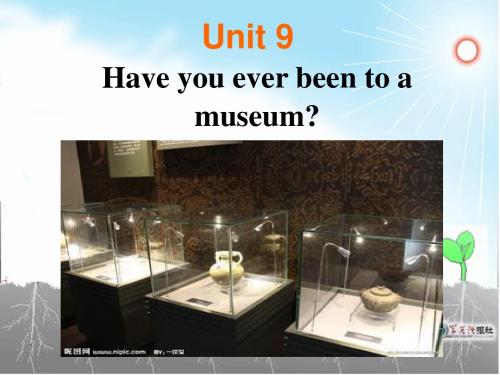
To learn the interview in 1b
Match the pictures with the names. (1a)
the Terracotta Army the Great Wall the Bird’s Nest the Palace Museum
1 b
Clterviewing a foreign student. Check the questions you hear. (1b)
Listen again and take notes. (1c) Name: Peter Country: Australia How long in China: two weeks Places visited: the Palace Museum, the Great Wall, the Bird’s Nest (in Beijing), the Terracotta Army (in Xi’an) Food: Beijing Duck
3. Have you________ heard of Disneyland? A. always B. ever C. never 4. - ______ did you start skating? - Five years ago.
A. When B. How long
C. How often
注: 另附word文档。 点击此处链接
单选。 1. Linda ____ the space museum after school yesterday. A. has been to B. was going to C. went to 2. You don’t need to describe her. I ______ her several times. A. meet B. will meet C. have met
2014春人教版初中英语8年级下册 Unit 9 Have you ever been to a museum 单元教案
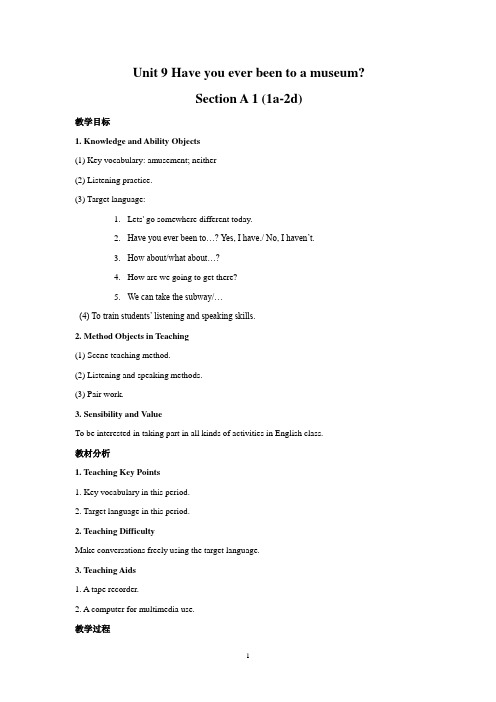
Unit 9 Have you ever been to a museum?Section A 1 (1a-2d)教学目标1. Knowledge and Ability Objects(1) Key vocabulary: amusement; neither(2) Listening practice.(3) Target language:1.Lets' go somewhere different today.2.Have you ever been to…? Yes, I have./ No, I haven’t.3.How about/what about…?4.How are we going to get there?5.We can take the subway/…(4) To train students’ listening and speaking skills.2. Method Objects in Teaching(1) Scene teaching method.(2) Listening and speaking methods.(3) Pair work.3. Sensibility and ValueTo be interested in taking part in all kinds of activities in English class.教材分析1. Teaching Key Points1. Key vocabulary in this period.2. Target language in this period.2. Teaching DifficultyMake conversations freely using the target language.3. Teaching Aids1. A tape recorder.2. A computer for multimedia use.教学过程Teaching ProceduresStep 1 Greetings and RevisionGreet the class and check the homework.Step 2 Lead-in1.Guess the places of the pictures; they are the British Museum, space museum, historymuseum, water park, zoo, amusement park while lead in sentence patterns:“ Have youever been to …?”2.SpeakingGet students to work in pairs to practice the conversation: “ Have you ever been to…”“Yes, I have”/ Not, I haven’t.Step 3 Pre-listening1. Section A 1aT: OK. Now open your books on Page 65. In Part 1a, 6 places are given. Please read the names of these places. (Teacher writes the names on the blackboard.) Which of these places would you like to visit? Rank them from 1 to 5.S4:Amusement park ______, water park ______, zoo ______ aquarium ______ space museum ______.S 5: Space museum ______, aquarium ______, zoo ______, water park ______, amusement park ______S6: …2. Talk about the pictureStep 4 Listening1.Listen and choose the best answer. The first and the second question aim to listening to time,and the third one aims to listen for the relationship. This activity trains students’ listening ability for listening for specific relationship.1)When did Sarah visit the National Science Museum?A. TodayB. Y esterdayC. Last year2)When did Claudia visit the nature museum?st yearB. last summerC. Last school trip3)What may the relationship be between the two speakers?A. FriendsB. Teacher and studentC. Mother and kid.Answer: CCA2.Listen again. Listen and check the boxes. Have these students ever been to these places?Step 5 SpeakingAsk and answer in pairs:A: let’s go somewhere different today.B: OK. Where do you want to go?A: Have you ever been to the space museum?B: No, I haven’t. How about you?A: …Step 6 Listening 2a 2b1.Listen and circle the places that you hear.2.Listen again and circle T for true or F for false.Conversation 11. Tina went to the space museum last year. T/F2. John has never been to the space museum. T/F3. They are going to take the subway. T/FConversation 21. Linda has been to the amusement park. T/F2. Linda went to the amusement park yesterday. T/F3. Linda is going to the amusement park again by bike. T/FConversation 31. Frank had a great time at the water park. T/F2. Frank’s friend has never been to the water park. T/F3. Frank and his friend are going skating. T/FAnswer: TFT TFT FTT3.SpeakingLook at the map in 2a and make conversations about the places.A: Have you ever been to the space museum?B: Yes, I have. How about you?A: No, I haven’t.B: Oh, it’s fantastic. Let’s go tomorrow.A: OK. How are we going to get there?B: We can take the subway.4.SpeakingRole-play the conversation in 2d.A: I went to the film museum last weekend. Have you ever been there? …B: Yes, I have. I went there back in April. ……Step 7 Language points1. I learned about the inventions that led to color movies, too. 我还了解了一些发明,它们成就了彩色电影。
Unit-9--Have-you-ever-been-to-a-museum--知识整理
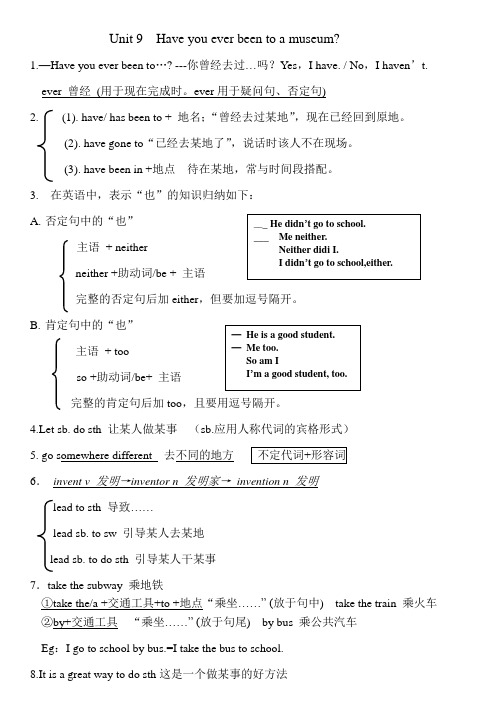
Unit 9 Have you ever been to a museum?1.—Have you ever been to …? ---你曾经去过…吗?Yes ,I have. / No ,I haven ’t. ever 曾经 (用于现在完成时。
ever 用于疑问句、否定句)2.(1). have/ has been to + 地名;“曾经去过某地”,现在已经回到原地。
(2). have gone to “已经去某地了”,说话时该人不在现场。
(3). have been in +地点 待在某地,常与时间段搭配。
3. 在英语中,表示“也”的知识归纳如下:A. 否定句中的“也”主语 + neitherneither +助动词/be + 主语 完整的否定句后加either ,但要加逗号隔开。
B. 肯定句中的“也”主语 + tooso +助动词/be+ 主语 完整的肯定句后加too ,且要用逗号隔开。
4.Let sb. do sth 让某人做某事 (sb.应用人称代词的宾格形式)5. go somewhere different 去不同的地方 6. invent v 发明→inventor n 发明家→ invention n 发明lead to sth 导致……lead sb. to sw 引导某人去某地lead sb. to do sth 引导某人干某事7.take the subway 乘地铁①take the/a +交通工具+to +地点“乘坐……” (放于句中) take the train 乘火车 ②by+交通工具 “乘坐……” (放于句尾) by bus 乘公共汽车Eg :I go to school by bus.=I take the bus to school.8.It is a great way to do sth 这是一个做某事的好方法9. go skating 去滑冰10. .on the weekend 在周末11. science museum 科学博物馆history museum 历史博物馆12.all the old movie cameras所有的古老的电影摄影机13.camp in the mountains 在大山里露营14.learn about 了解获知,得知learn about sth.了解有关……的情况15. an amusement park 一个游乐场16. the International Museum国际博物馆17. put up a tent 搭帐篷put up 搭起;举起;张贴rmation信息;资料(不可n.)some informationa piece of information 与about 连用,表示:“关于……的信息”19.It’s unbelievable that+从句“令人难以置信的……”20. make progress 取得进步make progress in 在......方面取得进步21.in such a rapid way 以如此迅猛的方式22.play chess 下棋23.be able to+V原能够做某事24.in the future在将来25.wonder 想要知道= want to know①后接从句eg:I wonder who she is.②也可接“疑问词+不定式”eg: I wonder what to do next.26.I couldn’t believe my eyes我无法相信我的眼睛。
人教版八年级英语下册Unit9 Have you ever been to a museum知识点梳理及单元复习
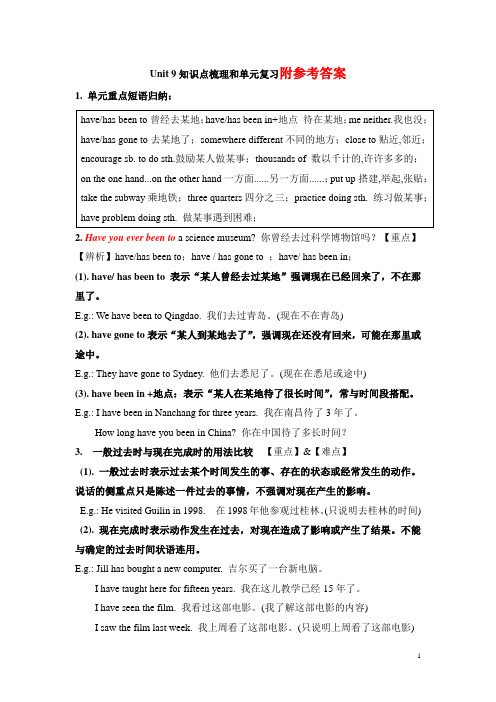
Unit 9知识点梳理和单元复习附参考答案1. 单元重点短语归纳:have/has been to曾经去某地;have/has been in+地点待在某地;me neither.我也没;have/has gone to去某地了;somewhere different不同的地方;close to贴近,邻近;encourage sb. to do sth.鼓励某人做某事;thousands of 数以千计的,许许多多的;on the one hand...on the other hand一方面......另一方面......;put up搭建,举起,张贴;take the subway乘地铁;three quarters四分之三;practice doing sth. 练习做某事;have problem doing sth. 做某事遇到困难;2. Have you ever been to a science museum? 你曾经去过科学博物馆吗?【重点】【辨析】have/has been to;have / has gone to ;have/ has been in;(1). have/ has been to 表示“某人曾经去过某地”强调现在已经回来了,不在那里了。
E.g.: We have been to Qingdao. 我们去过青岛。
(现在不在青岛)(2). have gone to表示“某人到某地去了”,强调现在还没有回来,可能在那里或途中。
E.g.: They have gone to Sydney. 他们去悉尼了。
(现在在悉尼或途中)(3). have been in +地点:表示“某人在某地待了很长时间”,常与时间段搭配。
E.g.: I have been in Nanchang for three years. 我在南昌待了3年了。
How long have you been in China? 你在中国待了多长时间?3. 一般过去时与现在完成时的用法比较【重点】&【难点】(1). 一般过去时表示过去某个时间发生的事、存在的状态或经常发生的动作。
unit9haveyoueverbeentoamuseum教案
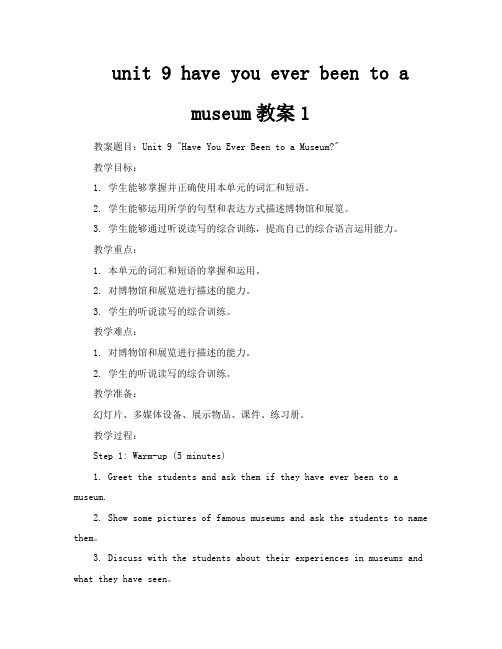
unit 9 have you ever been to amuseum教案1教案题目:Unit 9 "Have You Ever Been to a Museum?"教学目标:1. 学生能够掌握并正确使用本单元的词汇和短语。
2. 学生能够运用所学的句型和表达方式描述博物馆和展览。
3. 学生能够通过听说读写的综合训练,提高自己的综合语言运用能力。
教学重点:1. 本单元的词汇和短语的掌握和运用。
2. 对博物馆和展览进行描述的能力。
3. 学生的听说读写的综合训练。
教学难点:1. 对博物馆和展览进行描述的能力。
2. 学生的听说读写的综合训练。
教学准备:幻灯片、多媒体设备、展示物品、课件、练习册。
教学过程:Step 1: Warm-up (5 minutes)1. Greet the students and ask them if they have ever been to a museum.2. Show some pictures of famous museums and ask the students to name them。
3. Discuss with the students about their experiences in museums and what they have seen。
Step 2: Presentation (15 minutes)1. Present the new vocabulary and phrases related to museums and exhibitions using flashcards or pictures。
2. Introduce the target language structures through a short dialogue between a student and a teacher, using phrases like "Have you ever been to a museum?" and "What did you see there?"3. Model the pronunciation and intonation of the target language structures and have the students repeat after you。
Unit_9_Have_you_ever_been_to_an___amusement_park_seciontB
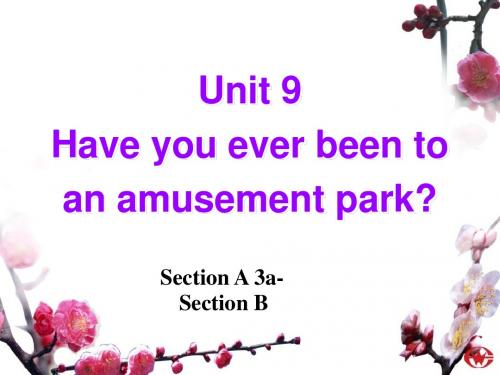
The theme of Disneyland is Disney
movies and Disney characters.
Disney characters
Mickey Mouse and Donald Duck
1955, the 1st one, Los Angeles
1971, the 2nd one, Florida
Unit 9 Have you ever been to an amusement park?
Section A 3aSection B
1.你曾经去过俄罗斯吗? Have you ever been to Russia? 2.不, 没去过。 No, I haven’t.
3.我也没去过。
Me, neither. (I haven’t, either.) 4.他曾经去过瑞典吗? Has he ever been to Sweden?
Task2 Read carefully and answer:
1.Why do we say the theme of the roller coaster is Disney characters? Because we can find Disney characters all over the roller coaster. 2.What can we do in Disneyland? We can play on the roller coaster, watch Disney movies, eat in Disney restaurant and buy Disney gifts. We can also see Disney characters walking around Disneyland all time. 3.What can we do on the boat in a Disney cruise?
2014春人教新目标八下unit9_have_you_ever_been_to_a_museum__Section_B_1

1.It’s a wonderful and safe place to take a holiday. 2.We can speak Putonghua. 3.It’s a good place to practice English. 4.We are able to find a lot of food from China. 5.It’s a place to try new food. 6.The Night Safari 7.Temperature is almost the same all year round (so you can visit it at any time) 8.It’s not too far from China
一方面……另一方面…… e.g. On the one hand, she taught English, on the other hand she learned Chinese. 她一方面教英语, 一方面学习汉语。
2. …more than three quarters of the population are Chinese… quarter n. 四分之一;一刻钟 three quarters 四分之三 e.g. I’ve got to go in a quarter of an hour. 一刻钟以后我就得走了。
★fear+从句 e.g. She feared that they weren’t friends any more. 她怕他们不再是朋友了。 ★fear to do sth e.g. She fears to go out at night. 她害怕晚上出去。
fear v. 害怕 fear sth. 害怕某事\某物 fear to do sth. 害怕做某事
新02014春人教新目标八下unit9_have_you_ever_been_to_a_museum_Section_A_1

(B)2. —_____ you ever _____ to a park?
—No, I haven’t.
A. Did, go
C. Will, be
B. Have, Байду номын сангаасeen
(A )3. —_____Tom ______ this book before? —Yes, he has. A. Has, read B. Does, read C. Will, read (B )4. — Where is your mother? —She _______ to New York. A. have gone B. has gone C. has been
I went to these places before, so I can say
I have been to a water park.
I have been to a space museum.
Have you ever been to a history museum? No, I haven’t.
Me neither. Let’s go to one tomorrow.
【点拨】have gone to去了 某地,表示说话时此人不 在现场;have been to去过 某地,表示说话时 此人已回到说话的地方。
3. —Where’s Zhang Peng? gone to (go) to our math —He has ___________ teacher’s office. 4. —What have you ________ studied (study) in this school? —Many things.
1b
Listening
Unit 9 Unit_9_Have_you_ever_been_to_a_museumB 1a-1d

A: How long have you been in China? B: I have been here for two weeks A: Have you visited the Palace Museum B: Yes, I have. I went there last week. A: Have you been to the Great Wall? B: Oh, yes. I loved it. A: Have you tried Chinese food? B: Oh, yes. I love Chinese food.
What do you know about the country? Australia
Australia: Sydney
France: Paris
Russia: Moscow
The United States: New York
What do you know about the country?
United Kingdom
What do you know about the country?
2. 能用现在完成时谈论过去的经历。 能口,笔头掌握以下句型:
Have Have Have Have Have you you you you you
visited the Palace Museum? been to the Great Wall? been to the Bird’s Nest? seen the Terracotta Army? tried Chinese food?
测测你的记忆力
Peter ___ _____ in China for two weeks. He has been is going back to Australia tomorrow. He has __ _____ seen ____ many interesting things here. He went to the Palace Museum last week. There are so ___many _____ beautiful treasures ________. He also has Bird’s Nest been to the Great Wall and the __________. Army in Xi’an is He thinks theTerracotta _______________ very fantastic. He loves ____________ Chinese food very much. Hisfavorite _______ dish is Beijing Duck.
- 1、下载文档前请自行甄别文档内容的完整性,平台不提供额外的编辑、内容补充、找答案等附加服务。
- 2、"仅部分预览"的文档,不可在线预览部分如存在完整性等问题,可反馈申请退款(可完整预览的文档不适用该条件!)。
- 3、如文档侵犯您的权益,请联系客服反馈,我们会尽快为您处理(人工客服工作时间:9:00-18:30)。
Unit 9 Have you ever been to a museum?
一、重点短语
1.at night在夜晚
2.in a more natural environment
在一个更加自然的环境中
3.all year round一年到头; 终年
4.be far from 离……远
5.in the dark 在黑暗中
6.in the past 在过去
7.have been to sp. 去过某地
8.science museum 科学博物馆
9.history museum 历史博物馆
10.amusement park 游乐园
11.go somewhere different 去不同的地方
12.go skating 去滑冰
13.take the subway 坐地铁
14.a great way to spend a Saturday afternoon
一个过周六下午的好方法
15.all the old movie cameras
所有的古老的电影摄影机
16.learn about sth. 了解有关......的情况
17.on the weekend 在周末
18.camp in the mountains 在大山里露营
19.put up a tent搭帐篷
20.in such a rapid way 以如此迅猛的方式
21.different kinds of各种各样的
22.development of toilets 厕所的发展
23.social groups 社会团体
24.the tea art performances茶艺表演
25.make a perfect cup of tea with beautiful tea sets
用漂亮的茶具沏一杯完美的茶
26.a nice place to enjoy tea 一个品茶的好地方
27.thousands of 数以千计的
28.International Museum of Toilets
国际厕所博物馆
29.the Terracotta Army 兵马俑
30.Southeast Asia东南亚
31.Night Safari 夜间动物园
32.three quarters 四分之三
33.an English-speaking country一个讲英语的国家
34.have problem doing sth. 做某事很困难
35.during the daytime在白天
36.a couple of times 好几次
37.right now 现在;目前
38.an amusement park with a special theme
一个有特别的主题的游乐园
39.walk around the park 在公园里到处走
40.hear of 听说
41.take a ride兜风
42.another province另一个省
43.the Bird’s Nest鸟巢
44.encourage sb. to do sth. 鼓励某人做某事
45.on the one hand... on the other hand.
一方面,另一方面
46.close to 贴近,邻近
47.take a holiday度假
48.practice doing sth. 练习做某事
二、重点句型
1. Have you ever been to... ?
Have you ever been to a science museum? 你曾经去过科学博物馆吗?
2. Let’s do sth 让我们一起去做某事吧
Let’s go somewhere different today.我们今天去个不同的地方吧。
3. It’s~\~adj. +that...
It’ s unbelievable that technology has p rogressed in such a rapid way!
科技以如此迅猛的方式发展真是令人难以置信啊!
4. Whether... , you’ll...
Whether you like Indian food,Western food or Japanese food, you’ll find it all in Singapore!
不管你喜欢印度食品、西方食品还是日本食品,在新加坡你都能找到!
5. One great thing is that. One great thing about Singapore is that the temperature is almost the same all year
round.新加坡一个很大的特征是它的气温几乎一年到头都是一样的。
6. It is best to do sth..
It is best to visit Singapore...最好……游览新加坡。
【反意疑问句】
一、定义:即附加疑问句。
表示提问人的看法,没有把握,需要对方证实。
二、结构:陈述句+ 附加疑问句?It’s hot today, isn’t it ?
三、原则: 1.前肯后否,前否后肯
2.前名后代
3.时态一致
They work hard, don’t they?
四、做题方法
(一)找动词
(1)如果句中有助动词、情态动词、be动词,反意疑问句中也相应的用助动词、情态动词、be动词。
He is a student, _____________?
( 2 ) 如果句中没有助动词、情态动词、be动词,只有实义动词时,就要借助助动词。
She often gets up at 6:30 every morning, ___________?
(二) 判断句子是肯定还是否定,“前肯后否,前否后肯”
The students have planted many trees, _________?
(三) 反意疑问句的主语必须转换成人称代词主格。
The boy can’t swim, ___________?
【分数词的表达法】:
1).结构:
a).分子用基数词,分母用序数词.
分子(基数词) 1
分母(序数词) 4 =one fourth = one quarter
b).当分子大于1时,分母为序数词加s.
¾ = three fourths = three quarters
2).注意:分数词的几种特殊形式.
1/3—one third = a third
1/4—one fourth = a quarter
1/2—one second = a half
3/4—three fourths = three quarters
3).分数词作主语时, 谓语动词根据分数词后面的名词来确定.
不可数名词+动词单三形式
分数+ of +
可数名词+ 动词变复数形式
Two fifths of the milk ______(be ) drunk by Tom .
One third of the students _______(be )girls .。
